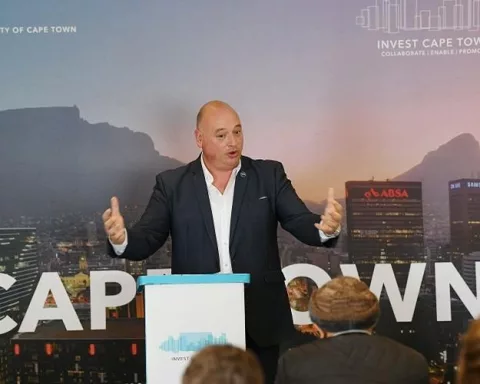South African Minister of Employment and Labour, T.W. Nxesi, announced a significant revelation regarding the R5 billion-rand deal with Thuja, casting a spotlight on the intricacies of political and economic operations in South Africa. Nxesi’s commitment to transparency and effective governance was evident as he vowed to explain his initiatives to manage the financial crisis. The press conference’s wider significance was felt beyond the government briefing, serving as a reassurance to the public that their government remains committed to the principles of transparency and accountability. The incident serves as a potent reminder of the importance of accountability in governance and the crucial role of the media and public in upholding these principles.
The R5 Billion Rand Dispute in South Africa: A Perspective on Minister Thulas Nxesi’s Statement
Section 1: The Announcement’s Resounding Impact
Seizing the spotlight in the media and public sphere, the South African Minister of Employment and Labour, T.W. Nxesi, has declared a noteworthy revelation regarding the contentious R5 billion-rand deal with Thuja. This declaration has amplified the intricacies and secretive dynamics of political and economic operations in South Africa.
The disputed deal has been embroiled in controversy since its exposure in December 2022, inciting fervent examination and fostering myriad conjectures. As the metaphorical dust began to subside, Nxesi, in an act exemplifying commitment to transparency and effective governance, vowed to maintain the trust of the nation and the media. He guaranteed an exhaustive explanation of his initiatives to manage this financial crisis.
Held in the Ronnie Mamoepa Press Room, named in honour of the celebrated South African journalist and government spokesperson, the briefing emphasized the event’s symbolic connotation. Nestled in Pretoria’s Tshedimosetso House, the location reverberated with the severity of the issue and its far-reaching consequences for the South African political and social framework.
Section 2: Nxesi’s Strategic Communication and Unyielding Resolve
Nxesi’s interaction with the media and public was far from a routine public relations effort. It was a strategic initiative designed to illuminate his actions and reassure about his determination to amend the circumstances. His commitment to keep the public abreast and his pledge to take definitive action to annul the agreement were evident.
His elucidation on these efforts reaffirms Nxesi’s comprehension of the situation’s gravity and his pledge to eradicate any trace of corruption or mismanagement. His resolve to confront the dispute head-on exemplifies the government’s commitment to ensure a judicious resolution.
The dispute underscores the intricacies of contemporary governance, where transparency and accountability are not mere ideals but integral components of efficient governance. Nxesi’s proactive communication methodology and his commitment to address the issue holistically serve as fine examples in this context.
Section 3: The Press Conference’s Wider Significance and Impact
The briefing was a pivotal occasion not only for the minister but also for the media, which had the chance to scrutinize the agreement’s complexities closely. The media’s instrumental role in this saga emphasizes the importance of free press in a democratic society. Their relentless pursuit of truth and insistence on transparency were crucial in maintaining the issue’s public visibility.
The event’s impact was felt beyond the government briefing, resonating with the public who have been following the developments keenly. The minister’s statement served as a reassurance to them that their government remains committed to the principles of transparency and accountability.
The R5 billion-rand agreement dispute acts as a crucial example of the complex relationship between politics, economics, and governance. Though the issue is multifaceted, it has been a significant test of the South African government’s strategy for managing contentious financial issues.
In summary, while the dispute over the R5 billion-rand agreement has undoubtedly cast a significant pall over the South African political scenario, the government’s response, marked by a commitment to transparency and definitive action, brings a ray of hope. The incident serves as a potent reminder of the importance of accountability in governance and the crucial role that the media and public play in upholding these principles. The repercussions of this saga will undoubtedly continue to ripple for a considerable period, shaping future discussions on good governance in South Africa.
1. What is the R5 billion-rand deal with Thuja, and why is it controversial?
The R5 billion-rand deal with Thuja is a contentious financial agreement that has been embroiled in controversy since its exposure in December 2022. Its controversial nature stems from its secretive dynamics of political and economic operations in South Africa, which have been the subject of fervent examination and conjectures.
2. What did Minister Thulas Nxesi announce, and why is it significant?
Minister Thulas Nxesi announced a noteworthy revelation regarding the R5 billion-rand deal with Thuja, casting a spotlight on the intricacies of political and economic operations in South Africa. His commitment to transparency and effective governance was evident as he vowed to explain his initiatives to manage this financial crisis. The announcement has amplified the issue’s severity and has underscored the importance of accountability in governance.
3. What is the wider significance of the press conference?
The press conference’s wider significance was felt beyond the government briefing, serving as a reassurance to the public that their government remains committed to the principles of transparency and accountability. The event emphasized the crucial role of the media and public in upholding these principles and maintaining a democratic society.
4. What is Minister Nxesi’s resolve in addressing the dispute, and what does it signify?
Minister Nxesi’s resolve to confront the dispute head-on exemplifies the government’s commitment to ensure a judicious resolution. His proactive communication methodology and his determination to address the issue holistically serve as fine examples of the government’s efforts to manage contentious financial issues.
5. What is the role of the media in this saga, and why is it important?
The media’s instrumental role in this saga emphasizes the importance of free press in a democratic society. Their relentless pursuit of truth and insistence on transparency were crucial in maintaining the issue’s public visibility and underscored the importance of accountability in governance.
6. What does this dispute signify for the future of good governance in South Africa?
The repercussions of this saga will undoubtedly continue to ripple for a considerable period, shaping future discussions on good governance in South Africa. It serves as a potent reminder of the importance of accountability in governance, and the need for transparency and effective communication in managing contentious financial issues.












